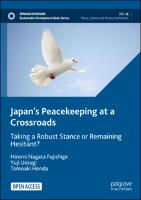Japan’s Peacekeeping at a Crossroads
Taking a Robust Stance or Remaining Hesitant?
Author(s)
Fujishige, Hiromi Nagata
Uesugi, Yuji
Honda, Tomoaki
Language
EnglishAbstract
This open access book examines why Japan discontinued its quarter-century history of troop contribution to UN Peacekeeping Operations (1992–2017). Japan had deployed its troops as UN peacekeepers since 1992, albeit under a constitutional limit on weapons use. Japan’s peacekeepers began to focus on engineering work as its strength, while also trying to relax the constraints on weapons use, although to a minimal extent. In 2017, however, Japan suddenly withdrew its engineering corps from South Sudan, and has contributed no troops since then. Why? The book argues that Japan could not match the increasing “robustness” of recent peacekeeping operations and has begun to seek a new direction, such as capacity-building support.
Keywords
Open Access; Japanese studies; peacekeeping; peacebuilding; security policy; United Nations; Japanese foreign policy; SDG 16; sustainable development goals; peace operations; Japan’s contribution to global peaceDOI
10.1007/978-3-030-88509-0ISBN
9783030885090, 9783030885090Publisher
Springer NaturePublisher website
https://www.springernature.com/gp/products/booksPublication date and place
Cham, 2022Imprint
Palgrave MacmillanSeries
Sustainable Development Goals Series,Classification
International relations
Politics and government
Asian history


 Download
Download Web Shop
Web Shop